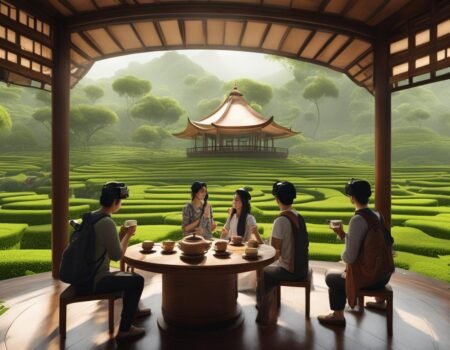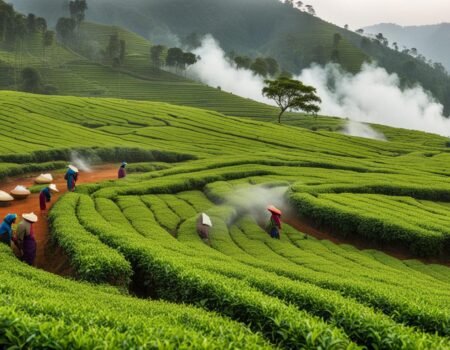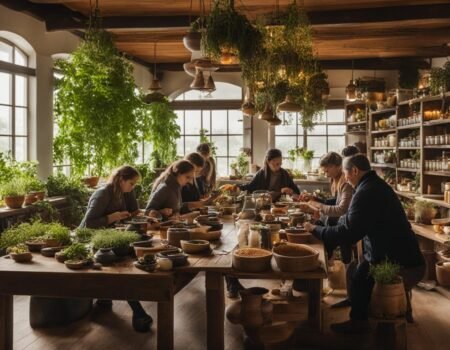
Authentic Tea Harvesting Experiences on Traditional Estates
Welcome, fellow tea enthusiasts! If you’re like us, you’re always on the lookout for unique and authentic experiences that connect you with the rich history and culture behind your favorite beverage. That’s why we’re here to introduce you to the world of tea harvesting experiences on traditional estates.
Imagine immersing yourself in the picturesque landscapes of tea-growing regions, surrounded by lush green tea gardens that stretch as far as the eye can see. Not only will you have the opportunity to learn about the intricate art of tea-making, but you’ll also develop a deeper connection with the origins of tea and the communities that make it possible.
By participating in hands-on tea tours, you’ll honor the roots of cultural engagement within tea regions and embark on a journey of discovery. Sustainable and inclusive travel experiences are predicted to be on the rise as international travel resumes, making it the perfect time to plan your tea adventure.
Key Takeaways:
- Tea harvesting experiences provide a deeper connection to the origin and processing of tea.
- Choosing sustainable and ethical tea tours supports local communities and preserves biodiversity.
- Tea adventures offer a blend of cultural engagement and tea tourism.
- Visiting traditional tea estates allows you to learn about tea and its cultural significance.
- Authentic tea tours provide opportunities for hands-on experiences like tea plucking.
Choosing an Ethical and Sustainable Tea Tour
Sustainable tourism is crucial when it comes to engaging in tea tours. As tea enthusiasts, we have a responsibility to support ethical practices and protect the environment. When considering a tea tour, there are several factors to keep in mind to ensure an ethical and sustainable experience.
Environmental Sustainability
One of the key aspects to consider is the tea garden’s environmental sustainability practices. Look for gardens that prioritize organic or natural cultivation methods, avoiding the use of harmful pesticides and herbicides. By choosing gardens that adhere to sustainable farming practices, we can help protect biodiversity and minimize the impact on local ecosystems.
Community Support
An ethical tea tour should also prioritize community involvement and support. Opt for tours that work closely with local communities, ensuring that the benefits of tea tourism are shared with the people who live and work in these regions. Understanding the background and commitment of tea garden owners and stakeholders is essential in making a conscious choice that positively impacts the community.
Cultural Engagement
Authentic cultural engagement should be an integral part of any ethical and sustainable tea tour. Look for tours that offer opportunities to learn about regional customs, traditions, and local languages. Hands-on experiences, such as participating in tea plucking and tea manufacturing processes, provide a deeper connection to the tea-making process and allow us to appreciate the cultural significance of tea.
| Factors to Consider for an Ethical and Sustainable Tea Tour: |
|---|
| Environmental Sustainability |
| Community Support |
| Cultural Engagement |
By choosing an ethical and sustainable tea tour, we can contribute to the preservation of tea-growing regions and support local communities. Remember, the choices we make as tea enthusiasts can have a significant impact, and embracing ethical and sustainable practices will not only enhance our tea tour experience but also help create a positive change in the world of tea.
Tea Harvesting Experiences in Different Regions
When it comes to tea harvesting excursions, there are various regions around the world that offer unique and memorable experiences. These adventures allow tea enthusiasts to go beyond sipping tea and truly immerse themselves in the process of growing and harvesting this beloved beverage. From the lush tea gardens of Nepal to the traditional tea-making practices in China and the high-mountain teas of Taiwan, there’s something for everyone to explore and enjoy.
Nepal Tea Collective in the United States
The Nepal Tea Collective offers an immersive ten-day tour that takes visitors on a journey through the stunning tea gardens of Nepal. Participants have the opportunity to meet tea farmers and producers, learn about the cultivation and processing of tea, and sample a wide range of delicious teas. This experience not only provides insights into the art of tea-making but also supports local communities and sustainable tea production practices.
Liubao, China’s Dark Tea Capital
The town of Liubao in Guangxi Zhuang Autonomous Region, China, is renowned for its dark tea production. Here, visitors can participate in tea plucking activities, witnessing firsthand the meticulous process of selecting the best tea leaves. They can also learn about the traditional tea-making techniques that have been passed down through generations. Exploring Liubao offers a fascinating glimpse into the rich tea culture and heritage of China.
Exploring Taiwan’s Tea Regions
Taiwan is famous for its high-quality teas, and venturing into its tea regions is a tea plucking adventure like no other. From Pinglin and Maokong to Hsinchu County, Nantou County, and Alishan, each region in Taiwan has its own distinct tea varieties and cultural experiences to offer. Visitors can learn about the unique tea-making traditions, witness the intricate art of tea plucking, and indulge in the diverse flavors and aromas of Taiwanese teas.
| Region | Tea Variety |
|---|---|
| Pinglin | Baozhong Tea |
| Maokong | Tieguanyin Oolong Tea |
| Hsinchu County | Dongfang Meiren (Oriental Beauty) Oolong Tea |
| Nantou County | Dong Ding (Tung-Ting) Oolong Tea |
| Alishan | High-Mountain Oolong Tea |
Embarking on tea harvesting adventures in different regions not only allows tea enthusiasts to expand their knowledge and appreciation for tea, but it also creates lasting memories and connections with tea cultures around the world. Whether it’s plucking tea leaves in Nepal, discovering the secrets of dark tea production in China, or exploring the diverse flavors of Taiwanese teas, these experiences provide a deeper understanding of the tea-making process and the communities that sustain it.
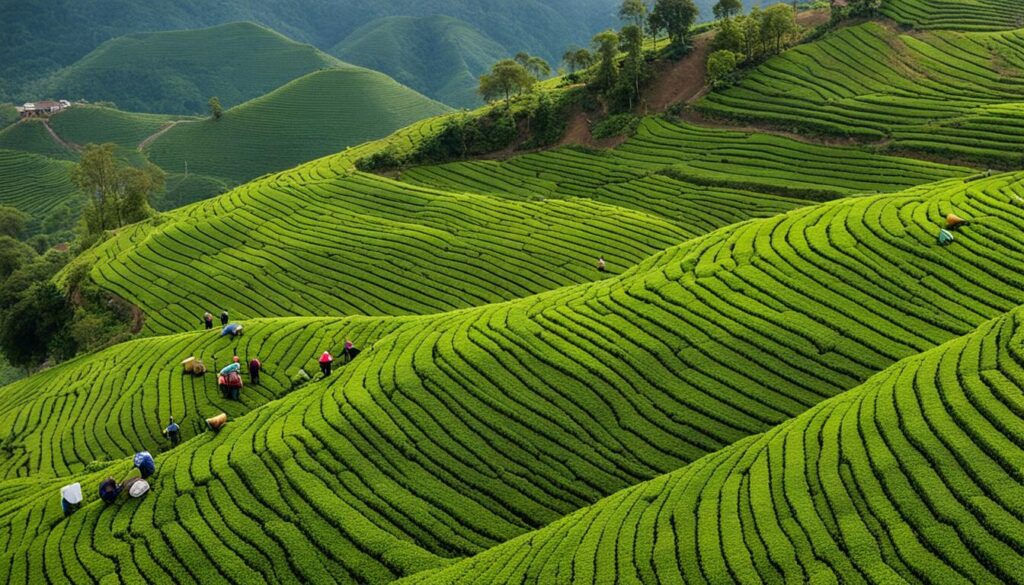
Taiwan’s Tea-Making Tradition
Taiwan has a long-standing tea-making tradition that encompasses a wide variety of unique teas. Influenced by the tea varietals brought over from mainland China, Taiwan has developed its own distinct tea culture. From the enchanting hills of Pinglin to the bustling city of Taipei, each region has its own specialty teas that showcase Taiwan’s rich tea heritage.
In the Pinglin district of New Taipei, you’ll find Baozhong tea, also known as Pouchong tea. It is a lightly oxidized oolong tea with a delicate floral aroma. The tea leaves are carefully plucked and undergo a meticulous rolling process, resulting in a complex flavor profile that is both refreshing and fragrant.
Maokong, located in the southern part of Taipei, is famous for its Tieguanyin oolong tea. This tea is highly regarded for its creamy texture and roasted notes, offering a unique sensory experience to tea enthusiasts. The hand plucked leaves go through a traditional oxidation and drying process, creating a tea that is smooth and aromatic.
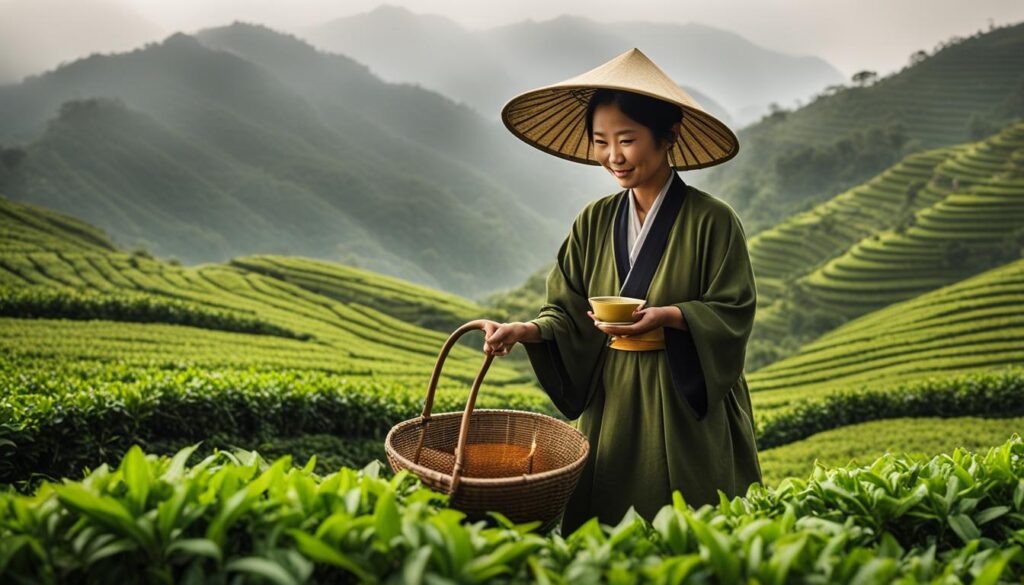
Hsinchu County is renowned for Dongfang Meiren, also known as Oriental Beauty oolong tea. This tea is harvested from tea gardens cultivated without pesticides, allowing nature to contribute to its unique flavor. It is a heavily oxidized tea with a sweet honey-like taste and a fruity aroma, making it a favorite among tea connoisseurs.
The Art of Taiwanese Oolong Tea
“Taiwanese tea culture is deeply rooted in our history and has become an integral part of our way of life. The diverse range of teas we produce reflects the skill and dedication of our tea artisans. It is an honor to share our tea-making tradition with the world.” – Tea Farmer
Nantou County is a tea lover’s paradise, offering Dong Ding oolong tea. Grown in the mountains, this tea has a distinct aroma and a smooth, mellow flavor. It undergoes a unique roasting process that adds depth and complexity to its taste, making it a prized tea among tea connoisseurs.
Lastly, Taichung is famous for being the birthplace of bubble tea, a popular Taiwanese beverage enjoyed worldwide. Bubble tea is a delightful combination of tea, milk, and tapioca pearls that creates a fun and refreshing drink. It has become an iconic symbol of Taiwan’s innovative tea culture.
With its rich tea heritage and diverse range of teas, Taiwan offers a multitude of tea experiences for enthusiasts to explore. Whether you’re sipping a fragrant cup of Baozhong tea in Pinglin or indulging in the creamy flavors of Tieguanyin oolong tea in Maokong, Taiwan’s tea culture is sure to captivate and delight.
Conclusion
Tea adventures offer a delightful blend of cultural engagement and tea tourism that allows us to immerse ourselves in authentic tea harvesting experiences on traditional estates. By participating in hands-on activities like tea plucking and learning about the tea manufacturing processes, we can develop a deeper connection to the origin and processing of tea.
It is important to choose sustainable and ethical tea tours that prioritize supporting local communities and preserving the biodiversity of tea gardens. By doing so, we can make a positive impact and ensure the longevity of this beloved beverage. Not only do these tours offer us the opportunity to explore regional customs and traditions, but they also allow us to savor the flavors of tea in a more meaningful way.
Whether we’re exploring the tea regions of Nepal, delving into the dark tea production in China’s Liubao, or indulging in the high-mountain teas of Taiwan, tea adventures provide us with unique experiences and lasting memories. By embracing the roots of tea culture and respecting the environments and communities that produce tea, we can embark on truly enriching tea adventures that combine our love for tea with a deep appreciation for cultural engagement.
FAQ
What should I consider when choosing a tea tour?
When choosing a tea tour, it is important to consider the environmental sustainability practices of the tea garden, such as avoiding harmful pesticides and herbicides. Additionally, consider the size of the tea garden and its impact on the surrounding ecosystem. Supporting small-scale gardens that benefit local communities is a positive choice. Authentic cultural engagement, including learning about regional customs and traditions, should also be a part of the tea tour.
What kind of hands-on experiences can I expect on a tea tour?
Tea tours often provide hands-on experiences such as participating in tea plucking and tea manufacturing processes. These activities allow you to develop a deeper connection to the tea-making process and gain a better understanding of the origin and processing of tea.
Are there any tea tours available in the United States?
Yes, The Nepal Tea Collective in the US offers an immersive ten-day tea tour where visitors can learn about Nepali tea gardens, meet tea farmers and producers, and taste a variety of delicious teas.
Which regions in China are known for tea harvesting experiences?
The town of Liubao in the Guangxi Zhuang Autonomous Region is known for its dark tea production. Visitors can participate in tea plucking activities and learn about traditional tea-making processes.
What are some famous tea regions in Taiwan?
Taiwan has a rich tea-making tradition, and there are several famous tea regions to explore. Pinglin in New Taipei is known for its Baozhong tea, Maokong in Taipei is famous for Tieguanyin oolong tea, Hsinchu County produces Dongfang Meiren (Oriental Beauty) oolong tea, Nantou County is renowned for Dong Ding (Tung-Ting) oolong tea, and Alishan in central Taiwan offers high-quality oolong teas. Taichung is the birthplace of bubble tea, a popular Taiwanese beverage.
How can I ensure sustainability and authenticity on a tea tour?
To ensure sustainability and authenticity on a tea tour, choose tours that prioritize environmental sustainability practices, support local communities, and offer authentic cultural engagement opportunities. By embracing the roots of tea culture and respecting the environments and communities that produce tea, you can have a more meaningful and responsible tea adventure.



